|

by CFAC Ed
December 04, 2015from
from
CFACT Website
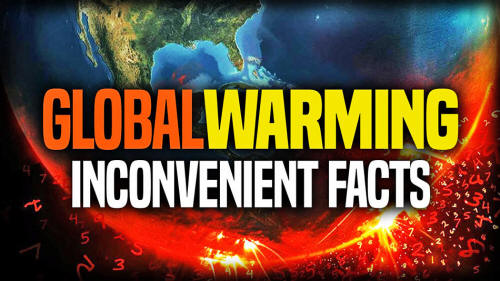
CFACT has participated in
the United Nations climate process going back to the
original Rio Earth summit. We are an officially recognized NGO
observer at
COP 21.
CFACT's display is in the NGO pavilion at booth 37c.
We used our space to inject four "inconvenient facts" into the COP.
They are the kind of rock solid, 100% scientifically valid points
that leave the warming-indoctrinated spluttering.
Here they are...
INCONVENIENT FACTS -
TEMPERATURE
Inconvenient Fact 1
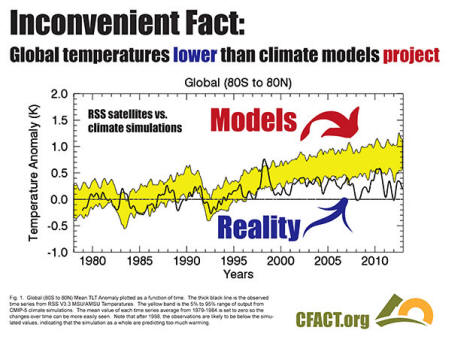
"Global climate trend since
Nov. 16, 1978: +0.11°C per decade"
University of Alabama, Huntsville
"The troposphere has not
warmed as fast as almost all climate models predict."
"After 1998, the observations are
likely to be below the simulated values, indicating that the
simulation as a whole are predicting too much warming."
Remote Sensing Systems
"Satellite analysis of the upper
atmosphere is more accurate, and should be adopted as the
standard way to monitor global temperature change."
NASA,
April, 1990
There is a "robust" cosmic ray-global
temperature relationship… and thus provide further corroboration of
the solar/cosmic ray theory of climate of Svensmark et al.
National
Academy of Sciences of the United States of America, Aug 2015
"Assuming the proposed cuts are
extended through 2100 but not deepened further, they result in
about 0.2°C less warming by the end of the century compared with
our estimates."
Massachusetts Institute of Technology, Energy and Climate
Outlook, 2015
"Using the peer-reviewed climate model MAGICC, I estimate the marginal impact of carbon reduction promises
called INDCs (Intended Nationally Determined Contributions) from the
EU, USA, China and the rest of the world, along with the likely
global policy output.
My major finding is that the total
effect is very small: less than 0.05°C difference by the end of
the century."
Global Policy, Nov. 2015
Inconvenient Fact 2
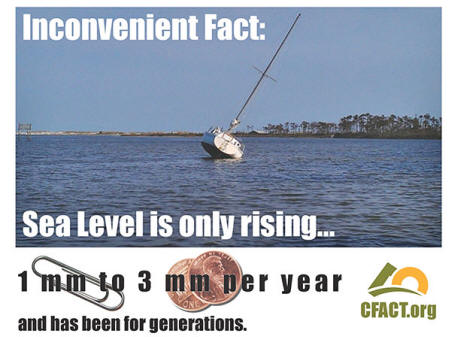
"Absolute global sea level
rise is believed to be 1.7-1.8 millimeters/year."
NOAA
"Tide gauge records along coastlines
provide evidence that mean sea levels (MSLs) have risen since the
late nineteenth century with globally averaged rates of 1.33-1.98 mm
per year…
There has been 'underestimation' of possible natural trends
of up to ~1 mm per year erroneously enhancing the significance of
anthropogenic footprints."
University of Siegen,
Nature Communications, July, 2015
"According to the new analysis of
satellite data, the
Antarctic ice sheet showed a net gain of 112
billion tons of ice a year from 1992 to 2001. That net gain
slowed to 82 billion tons of ice per year between 2003 and
2008."
"Antarctica is not currently
contributing to sea level rise, but is taking 0.23 millimeters
per year away,"
NASA
"Global sea level is less sensitive
to high atmospheric carbon dioxide concentrations than
previously thought."
Stanford,
Geology, August, 2015
Island nations not sinking
"No islands have been lost, the majority
have enlarged, and there has been a 7.3% increase in net island area
over the past century (A.D. 1897-2013).
There is no evidence of
heightened erosion over the past half-century as sea-level rise
accelerated. Reef islands in Funafuti continually adjust their size,
shape, and position in response to variations in boundary
conditions, including storms, sediment supply, as well as sea level.
Results suggest a more optimistic
prognosis for the habitability of atoll nations."
Geology,
March, 2015
Inconvenient Fact 3
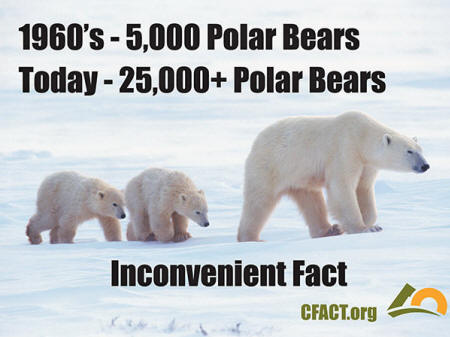
"The global population of polar
bears is about 26,000 bears. This is up 1,000 bears from 2014.
Estimations are between 25,000-30,000 bears globally."
International Union for Conservation of Nature
"Arctic sea ice is increasing,
with the extent of ice at the highest it has been since 2004."
Denmark Ocean and Ice Services
"Arctic sea ice persisted in
the James and Hudson bays well into August of 2015. It was
reported that the worst mid-summer ice conditions in 20 years
was preventing the routine delivery of supplies by ship."
NASA
"Sea ice in at least three
Eastern Canadian polar bear subpopulations was well above normal
for 2015."
Canadian Ice Services
Arctic sea ice is up by at least a
third after a cool summer in 2013. "It would suggest that sea
ice is more resilient perhaps," says Rachel Tilling, University
College London.
The Guardian, July 2015
Inconvenient Fact 4
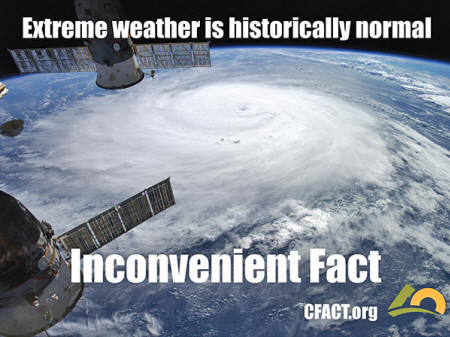
"We have identified considerable
inter-annual variability in the frequency of global hurricane
landfalls," the authors state, "but within the resolution of the
available data, our evidence does not support the presence of
significant long-period global or individual basin linear trends for
minor, major, or total hurricanes within the period(s) covered by
the available quality data."
Journal
of the American Meteorological Society, July 2012
"There is not enough evidence at
present to suggest more than low confidence in a global-scale
observed trend in drought or dryness (lack of rainfall) since the
middle of the 20th century."
IPCC
5th Assessment Report
"There is low confidence in any
long term increases in tropical cyclone activity… and low
confidence in attributing global changes to any particular cause."
Any increased hurricane damages "have not been conclusively
attributed to anthropogenic climate change; most such claims are not
based on scientific attribution methods."
There is "low confidence"
for trends on tornadoes, and "the evidence for climate driven
changes in river floods is not compelling."
IPCC
5th Assessment Report
"When closely examined there appears to
be no increase in extreme weather events in recent years compared to
the period 1945-77, when the Earth's mean temperature was declining.
The global warming/extreme weather link is more a perception than
reality (Khandekar et al. 2005). The purported warming/extreme
weather link has been fostered by increased and uncritical media
attention to recent extreme weather events.
The latest IPCC documents appear to
de-emphasize the warming/extreme weather link by suggesting 'low
confidence' in linking some of the events to recent warming of
the climate."
The Global Warming Extreme Weather Link, GWPF, 2013
|